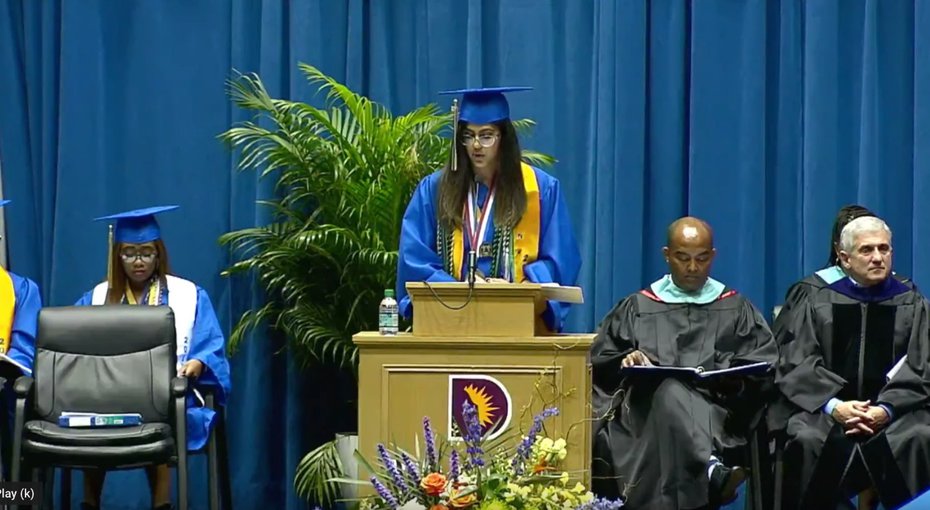Source: iranwire.com
Saleem Vaillancourt

Rooha Haghar, aged 19, is a Baha’i originally from Shiraz, Iran, now living in Dallas, Texas. On Saturday, June 1, she gave the valedictory address at Emmett J. Conrad High School, during which she chose to remember victims of police brutality in the United States, prompting her school principal to cut her microphone.
“To Trayvon Martin, Tamir Rice and all the other children who became victims of injustice,” she said, before the microphone stopped working, apparently after a signal from Emmett J. Conrad principal Temesghen Asmerom. Rooha then returned to her seat – to shouts of “Rooha!” from the audience and loud cheers.
Rooha’s Twitter post of the video of her truncated speech, where she previously had just 91 followers, has since been seen 1.7 million times and has attracted 120,000 likes. A series of media outlets – from NPR, to NBC, to CNN, as well as the Washington Post – interviewed Rooha as her post went viral. And celebrities including Yara Shahidi have helped to fan the flames by liking or sharing the post.
But Rooha’s activism started miles away and years before – in Iran.
“Being a Baha’i from Iran automatically makes you more socially conscious,” Rooha told IranWire. “For me, I experienced or heard about religious persecution for eleven years. My family members remembered it.”
Baha’is in Iran have been systematically persecuted by the government since the 1979 Islamic Revolution. Hundreds have been executed, thousands arbitrarily detained and jailed, and today Baha’is are routinely disrupted from earning a living and are almost universally blocked from higher education.
The climate for Baha’is in Iran pushed Rooha’s family to leave the country and claim asylum in the United States. And this background compelled her to remember people such as Martin and Rice in her speech.
“In our culture, American culture, we’re so numb to death and losing kids, with all the mass shootings, it’s been normalised. And I wanted the graduating students to [think about] these students who didn’t make it,” Rooha said.
Rooha also told CNN that her teachers advised her not to mention “controversial” subjects such as police brutality – but in an interview with NPR she said that promoting justice sometimes means we have to speak “outside the guidelines”.
“I realized that these names are making people uncomfortable,” Rooha said. “And if it takes people being uncomfortable to grow, and to have these conversations, then I’d prefer my speech to have that and be meaningful.”
But Rooha has also been careful not to blame her teachers or her school principal.
“From the replies and messages I’ve received, I know that the majority of people want my principal fired,” she said. “I’ve tried to do my part to shift the narrative to seeing this as a learning opportunity. Everyone makes mistakes … I don’t think my principal losing his job or me taking legal action is really the right direction.”
“I think, growing up with Baha’i principles and Baha’i teachings, I’ve learnt to be really patient and to try to understand the other person,” she added.
July 23, 2019 8:13 pm
I am distressed to hear that the name of the Baha’i Faith is associated with the remarks of this young woman who calls for an end to “police brutality” in the United States. What police brutality has she experienced in the United States? She reports none. It is ludicrous to compare the police in the United States to those in Iran. If you want to be imprisoned in your own home, denigrate the police and you will see hoodlums take control of the streets. Then you will know tyranny. Remarks like those of this young lady incite those who would disrespect, abuse, and murder policemen.
If you watch current events at all you will know that, in recent years, police officers have been the target of sniper attacks and assassinations. Their work is inherently dangerous and risking their lives on the job is a daily reality.
The two cases of alleged police brutality cited by this young lady—the cases of Trayvon Martin and Tamir Rice– do not make her point at all. Trayvon Martin did not die at the hands of police; rather, he was killed by a civilian vigilante, who had been told by a police dispatcher to stay away and leave the matter to the police. Had the vigilante left the matter to the police, the tragedy would have been averted.
The sad case of Tamir Rice arose from a juvenile’s reckless conduct, as he brandished a toy gun from which the orange cap had been removed, so that it could not be distinguished from a real gun. The police on the scene had not received any report that the person with the gun might have been a juvenile with a toy. You may say that the police made a mistake, or that the dispatcher was negligent in failing to convey the full report before the police arrived on the scene, but you cannot say the action was deliberate or malicious.
This young lady has unfairly taken sides in a bitter dispute, and done so without having investigated the facts nor lent any understanding to those on the other side of the dispute.